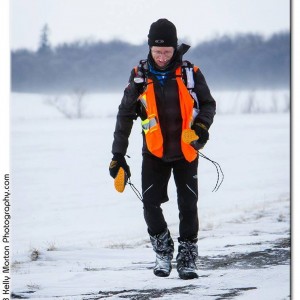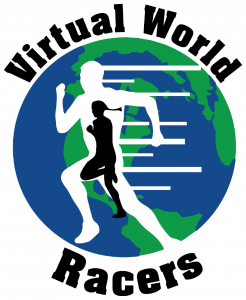A Ramble From the Heart
A Ramble From The Heart!!!
by Perry Newburn
Why do I run? As in the last blogs I have given you all a glimpse of how running has helped to reshape my life, how it has helped me to survive, and how it has helped my Mental Wellness. It has been a passion of mine over recent years to push the message of how any form of exercise – doesn’t matter whether its walking, running biking, swimming, kids playing with their mates – goes a long way to helping people feel “mentally” well.
How many times have people said after a long hard day “I cant be bothered doing anything…” But after putting on their shoes and getting out the door they have come back a much happier person. The “ distress” that goes with it can be huge. A classic statement I once heard from a fellow runner was “ I had had a very long stressful day at work and when arriving home my wife wanted to sit and talk about the day. I was too wound up so said I needed to go for a half hour run. When arriving back I was in a much better frame of mind to sit and be together and chat.”
A lot of people have said to me – “ how do you run and are able to run (crawl sometimes) for so long?” My comment is always – “ I am nothing special and anyone (within reason ) can do what I do, but the main thing is – you have to want to do it.” It does take a lot of work and time to build up to high mileage though.
This brings me to another passion of mine – GOALS. Again I am a firm believer in goal setting but it is something I had to learn and work at initially. In the past I probably wasn’t great at it and life just meandered on around me with me quite oblivious to everything going on. I remember in my 50th year I set 3 goals; 1) To survive till I turned 50. 2) To complete my university degree. 3) To run a marathon. I succeeded in all 3 and of course that first marathon was all about doing it and it was the only one I was ever going to do……….. I mean a marathon is so far!!
I have found many a time coming off a long run, there is a flatness, and if there wasn’t a goal to work towards I would struggle to get out the door. MJ’s have helped me immensely in keeping an accountability and motivation there. I always try and set realistic goals (even if sometimes on the edge a bit!!) and within reason I will immerse myself in them til the “appointed” time.
If however a goal is not quite reached that is also okay because it is what we learn from them that will help future ones – and often they only need a bit of tweeking. So the importance of goals for me – it gives me something to strive towards – and if they are not quite reached there is a reason and with a little bit of adjustment I will get there.
Now with the USA run firmly set for Sept/ Oct I need to put in a couple of sub goals as a lead up to the big one – 1) I still need to be raising a bit more sponsorship money, 2) I still need to be getting in fairly big mileage weeks with the back to back to back….. – but now its still a few months I can have a big month and then drop back a bit the following month. The drop back months are still relatively big (200 km weeks as opposed to 250 odd) by most peoples standards but now I have “ Trained the body and mind” to cope with the bigger mileage.
Some of it is about training the body and mind to run on “ tired”. I still need to be aware of little niggles and am a strong believer in lots of stretching. The other goals I have set myself for the next few months are; to run a 3hr 20 min marathon, to run a 1 hr 34 min half marathon, and also to run a 43 min 10 km. This will break up the training a bit more with speed work put into the equation. .
I am hoping to “launch” the USA run in possibly April by doing a 24 hr run with the goal of 200 + kms. All these things are in place to keep the motivation high in the lead up to the big goal. Keep on exercising and remember its got to be FUN.
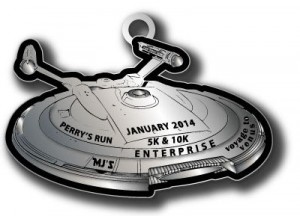 Moon Joggers is hosting a virtual race, the Enterprise 5K & 10K, in February 2014 to help Perry raise the needed funds to come to the United States and run across American (from California to New York!). Sign up and support Perry now!
Moon Joggers is hosting a virtual race, the Enterprise 5K & 10K, in February 2014 to help Perry raise the needed funds to come to the United States and run across American (from California to New York!). Sign up and support Perry now!
Lessons Learned From Running
Lessons Learned from Running
by Christine Erickson
“When the student is ready the teacher will appear.”
I first heard this while taking a yoga class, but it has actually reflected my running experience. As I mentioned in my first blog post, I’ve not always been a fan of running. I used to slog through miles eagerly anticipating the end of the drudgery. Running was no more than a means to an end for me until I fully opened myself to the whole experience. I don’t remember a specific ‘aha!’ moment, but sometime in the last year and a half I became a ready and willing student of running, and it’s lessons have been seeping into the rest of my life. These are some of the things I’ve learned so far.
It’s important to develop daily habits. This may seem like a no-brainer for most folks, but I have gotten through most of my life flying by the seat of my pants with virtually nonexistent organizational skills. I can rise to the occasion for something really important, but I usually regress into my non-planning/doing-things-at-the-last-minute mode. In my career as an ER nurse I’m used to long, chaotic, and variable shifts, which I prefer to a 9-5 Monday through Friday gig; however, it is more difficult to plan things since I don’t have a regular schedule. When I made room for running in my life, I quickly realized that consistency was key to building and sustaining the habit. While the rest of my life may be chaotic, running needed to be my core routine. If I didn’t want to go through the experience of starting at square one again I realized I needed to keep running and I committed to run every other day.
Speaking of commitment, this was also a key lesson learned. I’ve said for years I’d like to run a marathon someday, but wishful thinking and the sporadic jog around the block wasn’t going to get me there. I had to commit not just to running, but also to being a runner. Running is great exercise but, from my experience, to view it as only that ignores all the other rewards (and lessons) it has to offer. It’s a subtle but important difference.
I quickly realized that all successful runners have goals. Running a marathon is a grand goal, but I need to meet many short-term goals in the meantime. And it’s important that they are my goals. PR and distance goals are valuable; however, I also need to make goals that focus on the running journey rather than just the destination. One of my overriding goals is to enjoy running for the rest of my life, which means I am focused on remaining injury-free. Although it is possible to run one’s first marathon within the first few months of running, most experts recommend establishing a solid running base and gradually increasing mileage. I do still want to run a marathon (and more), but not at the expense of my future running life.
Forgiveness. I don’t always meet my goals. Sometimes there’s a good reason, sometimes not. Whatever the reason (or excuse) I’ve learned not to flog myself or feel a failure. I reevaluate and set new goals. The ability to forgive myself has made me more empathetic and forgiving toward others.
I am a slow runner, so I have learned patience. In the beginning I learned it was okay to walk. Sometimes I need to remind myself of that lesson. Running doesn’t get jealous if I walk once in a while. In fact, it often rewards me with better performance. Slowing down and taking time to be in the moment is very gratifying. However, it’s also important to change up the pace once in a while. It’s not necessary, nor is it safe or healthy, to go full out all the time. On the other hand, if I don’t push myself now and then I’ll never get better or know what I’m capable of.
I get out of running whatever I put into it. If I’m bored with my running, it’s my fault. I’m not saying every run has to be a thrill replete with revelations, but if it’s starting to feel like a slog it’s up to me to reframe it. Sometimes it’s just a matter of resetting my mental state. But it’s also important to change the route or try adding something new to the routine such as interval training.
As great as running makes me feel overall, it’s a give and take relationship. Just like my interpersonal relationships, it’s important that I am contributing effort too and not just expecting running to constantly reward me with one endorphin high after another. There will be hard times, but if I’m willing to stick it out, my relationship with running will grow stronger.
Other than illness or injury, there are very few valid reasons not to run. The Moon Joggers who have kept running through the Polar Vortex have made this lesson loud and clear. I’ve lost a few battles with the too warm bed too early in the morning. Ultimately, no matter what excuse I may give for not running, the only person I’m kidding is myself.
I’ve learned to embrace hills rather than trying to avoid them. Hills are the equivalent to the challenges in our lives. We can try to run around them, but eventually we have to face them head on and give it our best shot. This is a lot easier if we’ve had some practice.
It’s impossible for me to stay angry, stressed, or depressed while running. Running demands all my energy and positively transforms it. Running helps me focus on what really matters in life. Has running made me a wiser, happier person or am I just high on endorphins? Whatever the reason, I’m a better person for it and I look forward to each new lesson. What has running taught you?
My First Half-of-a-Full Marathon
by Michelle Roberts
 Looking back at the race expo for my first full marathon, I’m convinced it was my favorite part of my pre-race preparation but also maybe my worst mistake.
Looking back at the race expo for my first full marathon, I’m convinced it was my favorite part of my pre-race preparation but also maybe my worst mistake.
After a full week of encouraging posts and wonderful advice from all the Moon Joggers who have been there before me, I was so excited to participate in my first full marathon, the 40th Anniversary of the Tallahassee Marathon on Feb 2nd. When it came to the Expo, I decided against attending the viewing of “The Last Mile” to be sure I ate a proper lunch and had time with my two children before race day. But I didn’t want to miss the first speaker, Bart Yasso of Runners World. So I picked up my race packet, walked through the small sponsor displays and had a seat near the front.
He was speaking about all the unexpected places running can take you in your life. With new Moon Jogger friends from all over the world and one, Hector from Germany, who created a FaceBook page just to invite everyone to cheer me on, I knew exactly where he was coming from. His photos included pictures from his first time at Badlands and he talked about the sinking feeling he had when the race director announced the 146 miles with one minute to start. It was 126 miles further than he had ever run before! For me it made those last 6.2 after training to 20 seem easy. He shared about the time he ran a marathon in Kilimanjaro with 149 East African runners. Even at the peak of his ability his 2:40 time brought him squarely to a finish line with no clock, no sign and no spectators. Enjoying lunch by then, the Race Director joked that he must have gotten lost along the way since all the other runners were hitting the showers. And when he told him that in the US they keep the chute open for 5:30 to 6 hours, the man laughed saying no one could ever run a marathon for so long. Bart Yasso told funny stories about his assignment in the Bare Buns Run in a nudist camp in Washington State and recounted more serious subjects like the way the Comrades Marathon in South Africa influenced the movement to end apartheid.
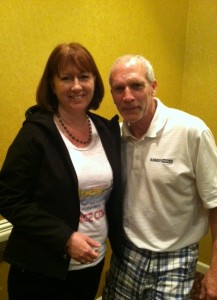 This runner, this writer was a Moon Jogger long before the group was ever created. I sat through his talk twice expecting a different topic but so glad I could hear it all told again with added details and new questions from the audience. He is filled with love of the sport and a deep appreciation for the amazingly generous and good-hearted community of runners around the world! If you ever have an opportunity to hear him speak or haven’t yet read his book, I encourage you to do both. So sitting through his talk twice was by far my favorite part of my pre-race preparation.
This runner, this writer was a Moon Jogger long before the group was ever created. I sat through his talk twice expecting a different topic but so glad I could hear it all told again with added details and new questions from the audience. He is filled with love of the sport and a deep appreciation for the amazingly generous and good-hearted community of runners around the world! If you ever have an opportunity to hear him speak or haven’t yet read his book, I encourage you to do both. So sitting through his talk twice was by far my favorite part of my pre-race preparation.The morning of the race was wet and drizzling. Not pouring rain or even dripping into my eyes just a really dense fog and light drizzle at times. I’d followed the advice of all my Moon Jogger friends for days in advance. Rested well Friday night in case I couldn’t sleep Saturday, like Sheila recommended. Ate 3 hours before the race like Eric mentioned, hydrating well until an hour and a half before the start. I even laid out my clothes like the first day of school to be sure I didn’t forget anything. I had my pics of Sheila and her mother from Space Coast Half Marathon that I pinned beneath my bib number, my Moon Jogger button on my shoe, the Voyage to Venus bracelet on my wrist and even my Voyage to Venus bib pinned to the back of my Space Coast shirt for good measure. Partly in hopes of recruiting a few new members along the course.
That was until I slipped on wet leaves at mile 4! I didn’t fall but righted myself, jarring/twisting my left knee. The trees lining the course were no longer my favorite thing about the race! Despite the pain in my knee I managed to keep up with the few runners I’d marked for pacing. They crept a little further ahead but not too far. As we approached the half marathon turn around I knew I was slowing down and then it happened. Every single runner around me turned! Every single one! I think I even shocked the volunteers when I continued forward toward the marathon turnaround another 1/4 marathon ahead. I couldn’t see a soul ahead of me, either. No one except the police officers still blocking the roads. And the volunteers who cheered me on for continuing to fight. I remembered the email I’d received from the race directors a couple weeks before announcing that they were closing the half marathon to current registrants due to an overwhelming number of requests to downgrade from the full. That’s where my people were now, headed back to finish the half. I was proud of myself for staying true to my original goal and showing up for the full no matter the outcome.
I have to say those miles between 7-13.1 were hard. I knew I was last because of the injury but didn’t want to concede. There weren’t even runners headed back toward me for miles since the marathoners were still headed toward their turnaround and the half marathoners were all behind me. But I kept pushing ahead, running as often as I could but hobbling by the time I started to see the marathon leaders heading back. The other runners were great! The volunteers were so encouraging! And I kept thinking about what Sheila Dawe said about enjoying the race no matter what. It was a beautiful course and I was determined to see the entire thing. Just maybe not twice.
 ABOUT: Michelle Roberts lives in Tallahassee, Florida, with her husband, Paul, and two children, Ashleigh (10) and Philip (8). She ran her first 5k in October of 2012 and her first half marathon in February of 2013. She was diagnosed with Bipolar Disorder in 2001 and maintains a healthy balance without the use of medication thanks to a job she loves, a supportive family, regular exercise, her writing and therapy. A wonderful life of “Both Hills and Valleys”.
ABOUT: Michelle Roberts lives in Tallahassee, Florida, with her husband, Paul, and two children, Ashleigh (10) and Philip (8). She ran her first 5k in October of 2012 and her first half marathon in February of 2013. She was diagnosed with Bipolar Disorder in 2001 and maintains a healthy balance without the use of medication thanks to a job she loves, a supportive family, regular exercise, her writing and therapy. A wonderful life of “Both Hills and Valleys”.
“The marvelous richness of human experience would lose something of rewarding joy if there were no limitations to overcome. The hilltop hour would not be half so wonderful if there were no dark valleys to traverse.”
Helen Keller
My First Marathon: Part 1
My First Marathon- A Runners Journey Part One
By Tina Bond
Mind and Body Disconnect
Meandering thoughts from the trail: Mind and Body Disconnect
by Sheila Dawe
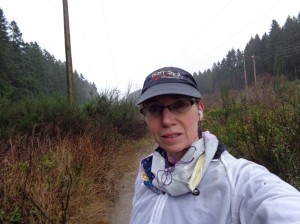
A very sodden Moon Jogger, Sheila, having been in the rain for the most of the day.
A new year means all sorts of amazing possibilities. I have big plans for 2014, a significant year as I am turning 50. I have signed up for numerous races: 2 marathons, my first 12 hour event a 50 miler followed the next day by a 50 km both in the mountains, and a 100 miler, a couple of these races downright scare me. As early as October last year I had nearly my whole year’s training already inked into a calendar. Prior to December, I was very optimistic with a “can do” attitude which motivated me for the flurry of registering for race, after race, after race. When Christmas arrived and I got the flu and doubts began to set in. New Year’s Eve I was up all night but not in a good way. What a start 2014. In addition to not feeling healthy, I had a pain in my foot which a little voice in the back of my head was repeating “stress fracture”. After a week break from running, due to being sick (probably the longest time I’ve taken off in years), I thought all my little aches and pains would go away – they didn’t. Everything was hard, a struggle and hurt. What have I got myself into, will this go from my best year to my worst?
It feels so unfair when the body doesn’t behave the way I expect it to. It feels deceitful when the body lets me down. This disconnect between what I think I can do and what I am actually able to do comes in many forms: recovering from injury, adverse training conditions, and unfulfilled race expectations. I had a serious fall 5 years ago which significantly changed my abilities as a runner. As I rehabbed and slowly developed I learned that I really can only do what my body is capable of doing, not what my mind thinks I should be able to do. Every once in a while the mind begins to play tricks taunting me with different potential marathon times. Sometimes I believe it so much that the first 10 km will be on pace, then the mind switches gears and decides that race plan wasn’t such a good idea after all. At that point the body takes over as the mind tends to give up. The mind is full of negatives, belittling the body, heckling it for steadily slowing down, and chuckles softly as the various pace bunnies past us.
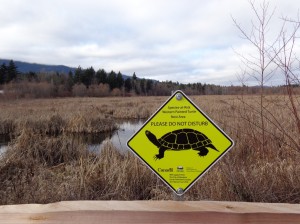
My weekly long run takes me through a bird sanctuary with a protected marsh land, Buttertubs Marsh, Nanaimo, B.C.
I know that I should do baby steps in trying to pick up my marathon times. I may never regain the form prior to my fall, especially as the age clock keeps ticking on, but that stubborn mind still wants the body to be as fast as it was prior to the accident and an age category ago. The mind thinks that if it can get the body to believe then it will be able to dig deep and make it happen. To be honest, I don’t know which one is right and what my actual potential is. This is one of the key reasons that I like running ultra-marathons, because the mind butts out of the conversation. The mind is not so demanding and full of great expectations. The mind has a new job which is keeping the body going slow, making sure to remember to eat and drink, knowing it is a long ways to go, and just keep the body keeping on.
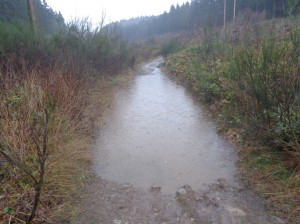
I had to run right through this puddle/pond in shin deep cold water. There comes a point that once you are wet you can’t really get much wetter.
The one other time that there is a major disconnect between these two is during training. It is so difficult to not let the mind see the Garmin and start lamenting over the pace, despite fully knowing that long runs can be as slow as the body needs to go. Recently I was doing an 11 miler in a torrential downpour over an extremely hilly route with pain still in my foot and ever present in the knees. Added to the misery I still hadn’t fully recovered from the holiday flu and had hacking cough occur at each walk break. I was proud when I finished yet I couldn’t help but look at the pace and ask myself “how will I ever run over a minute per km faster on race day”? Now I fully know that you can’t translate training runs to race day runs – taper hasn’t occurred, you are still building strength (especially in week 2), and besides I was not 100%. Yet I will still feel a touch of disappointment as I note the pace in my journal.
Bottom line, I know that I am a turtle and I should embrace what I do best…running all the runs I plan to run despite how slow or fast I go. The slower I go, the more time I get to enjoy all around me and the joy of running. Come race day I will do the best that I can do and be happy with sense of accomplishment after the race. If I can get all my training runs in then I will give the body a chance at making peace with the mind. I am sure they will continue to battle but they will also learn to get along and they are always able to see each other’s point of view at the end of the day. Happy trails everyone.
 Biography: Sheila being 49 years old, single, with no kids has the perfect lifestyle for becoming an obsessive runner. Her 77 year old mother, Catherine Campbell (another Moon Jogger) moved in next door to her in 2000. After cheering Sheila on at multiple marathons, Catherine finally caught the running bug. Sheila taught her to run in 2009 and this year is very significant as Sheila is training Catherine to complete her first ever half marathon. Sheila works for the Government of Canada as a fish health technician but longs for the day when she can retire and dedicate even more time to her passion…running.
Biography: Sheila being 49 years old, single, with no kids has the perfect lifestyle for becoming an obsessive runner. Her 77 year old mother, Catherine Campbell (another Moon Jogger) moved in next door to her in 2000. After cheering Sheila on at multiple marathons, Catherine finally caught the running bug. Sheila taught her to run in 2009 and this year is very significant as Sheila is training Catherine to complete her first ever half marathon. Sheila works for the Government of Canada as a fish health technician but longs for the day when she can retire and dedicate even more time to her passion…running.
INJURIES
Rocking on the Roads: “Injuries”
By Hector Romo-Parra

It’s a sunny day you have dressed for the occasion, wearing your running shoes and tied the shoes laces (not applicable for barefoot). After warming up you start pushing yourself towards, in a slight forward lean, while moving one leg and the opposite arm to the front, this foot strikes the ground and gives you propulsion to the front… then you do the same movements but with the opposite limbs; repeating the cycle once again and so on… As we all know here: “running is characterized by the repetition of a large number of almost identical movements with very few variations.”(1)
During this cycle our body is subject of high repetitive stress which produces small micro-trauma. These micro-trauma can be healed within a short period of time but if we stressed the body to the limits the micro-traumas can be accumulated and worsen followed by insufficient time to repair (2). Then at this point we are talking about injuries.
Running-related injuries or RRI have been defined as: ” …physical pain or complaint located at the lower 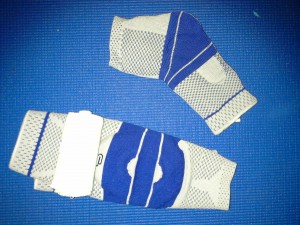 limbs or lower back region, sustained during or as a result of running practice and impeding planned running activity for at least 1 day.” (Malisoux) and are generally divided into two broad categories: 1) traumatic injuries (like fractures); and 2) cumulative micro-trauma injuries (Hammil).
limbs or lower back region, sustained during or as a result of running practice and impeding planned running activity for at least 1 day.” (Malisoux) and are generally divided into two broad categories: 1) traumatic injuries (like fractures); and 2) cumulative micro-trauma injuries (Hammil).
While running we subject the musculoskeletal system to two different types of forces: external impact forces and active forces. The external are influenced by variables related to the equipment and running surface (like: soft tissue, shoes, surface of contact, etc.) (2). On the other hand, active forces are related to the body itself and mainly determined by the movement of the runner during foot contact. Although RRIs are generally thought to be connected to impact forces, there is evidence suggesting that active forces also play a significant role in some overuse injuries (5). There is consistent epidemiological support for the role of a few aetiological factors that might influence RRI; i.e. higher mileage per week, previous running injury, higher running speed and lesser running experience. (6)
The incidence of RRI has recently been reported between 19% and 79% (7), attributable to an increase in training volume and intensity and exacerbated by internal or external factors. The most common site of lower extremity injuries was found to be the knee (7.2% to 50.0%), followed by the lower leg (9.0% to 32.2%), the foot (5.7% to 39.3%), and the upper leg (3.4% to 38.1%).
Prevention
It is important to have a slow progression in your training and also to quantify the stress of each training session.
An increase in volume should not exceed 10% per week.
The weekly long run should not exceed the one from the previous week by more of around 10 minutes.
Add some cross-training to your schedule. Swimming, biking or weight lifting are less stressful than running and help you to strength your muscles. The practice of other sports would be a protective factor as this also allows a variation of the type of stress applied to the body (Malisoux) as suggested “Runners who spend more time in others sports decrease their risk of overuse injuries, because they use different muscle groups” (Jacobs & Berson, 1986).
New surfaces like after wet ground or after the first snowfall can lead to RRI so be careful about that.
The most important thing to do is to treat not only the injury itself, but the cause of the injury. Previous running injuries are also reported to be a strong predictor for future injuries in several studies (Kretsch et al., 1984; Macera et al., 1989, 1991; Walter et al., 1989; Wen et al., 1998).
Finally, I did not aim to give any kind of advice about how to prevent or how to treat an injury. This post was simple mind to give information. If you feel pain it is better to stop stressing your body and consult a professional.
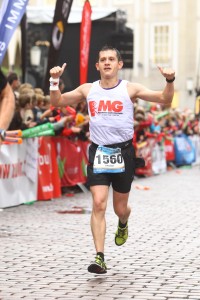 Héctor is a runner during mornings and a Neurophysiologist during days. He lives in Germany and he runs for two motivations: his 4 year old Son who is living in Mexico and to raise funds for “The Myasthenia Gravis Association” since he has been diagnosed with this disease.
Héctor is a runner during mornings and a Neurophysiologist during days. He lives in Germany and he runs for two motivations: his 4 year old Son who is living in Mexico and to raise funds for “The Myasthenia Gravis Association” since he has been diagnosed with this disease.
If you would like to support him please go to: http://www.justgiving.com/Hector-Romo-Parra
References
1) Theisen D, Malisoux L, Genin J, Delattre N, Seil R, Urhausen A. Influence of midsole hardness of standard cushioned shoes on running-related injury risk.
Br J Sports Med. 2013 Sep 16.
2) Hreljac A. Impact and overuse injuries in runners. Med Sci Sports Exerc. 2004 May;36(5):845-9.
3) Malisoux L, Ramesh J, Mann R, Seil R, Urhausen A, Theisen D. Can parallel use of different running shoes decrease running-related injury risk? Scand J Med Sci Sports. 2013 Nov 28
4) Hamill J, Palmer C, Van Emmerik RE. Coordinative variability and overuse injury. Sports Med Arthrosc Rehabil Ther Technol. 2012 Nov 27;4(1):45
5) Messier SP, Davis SE, Curl WW, Lowery RB, Pack RJ. Etiologic factors associated with patellofemoral pain in runners. Med Sci Sports Exerc. 1991 Sep;23(9):1008-15.
6) Hoeberigs JH.Factors related to the incidence of running injuries. A review. Factors related to the incidence of running injuries. A review. Sports Med. 1992 Jun;13(6):408-22.
7) van Gent RN, Siem D, van Middelkoop M, van Os AG, Bierma-Zeinstra SM, Koes BW. Incidence and determinants of lower extremity running injuries in long distance runners: a systematic review. Br J Sports Med. 2007 Aug;41(8):469-80


